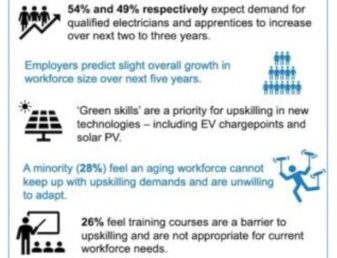The domestic electrical market in England now has a formal, funded training structure following the approval of the new Domestic Electrician Level 3 apprenticeship standard.
With the new apprenticeship, approved this week by the Institute for Apprenticeships and Technical Education, domestic electrical work now has its own clear identity with an industry standard and assessment route agreed by employers.
Three years in duration, the apprenticeship standard provides a comprehensive Level 3 training programme that will cover all facets of planning, installing and maintaining electrical services within a domestic setting. It also includes training and assessment in Domestic Electric Vehicle charging point installation, and will provide a strong platform of foundation skills to equip learners to undertake further training in the installation of new and low carbon technologies.
Domestic Electrician apprentices will gain a new Level 3 technical Electrotechnical in Dwellings qualification and will have to carry out an in-depth End Point Assessment that is a modified version of the existing industry assessment of competence, the AM2.
The standard was developed by an industry employer group, in response to growing demand for a high-quality training route that clearly ring fences domestic electrical work and provides a structured training programme for both new entrants and those already in the workforce. Neil Moran, Technical Safety Assurance Manager at British Gas and Chair of the Employer Group, commented: “For the first time, the role and scope of a domestic electrician has been precisely defined to give the role a funded, formal training pathway and clearly demarcate this occupation from the Installation Electrician standard.
“With the introduction of the Domestic Electrician apprenticeship, we now have a structured route for training highly skilled and competent individuals for the significant amount of work carried out by employers working in the domestic sector. It will help us attract new entrants and raise competence levels to a clear industry benchmark. We hope that training providers will join employers in delivering high quality apprenticeships against the new standard.”
Work on a new Experienced Worker Assessment for domestic electricians is also now underway, to establish a rigorous process for upskilling, based on the apprenticeship standard, for those already working in the industry.
More information on the Domestic Electrician Apprenticeship and Experienced Worker Assessment will be available on The Electrotechnical Skills Partnership and Electrical Careers websites in the near future.






